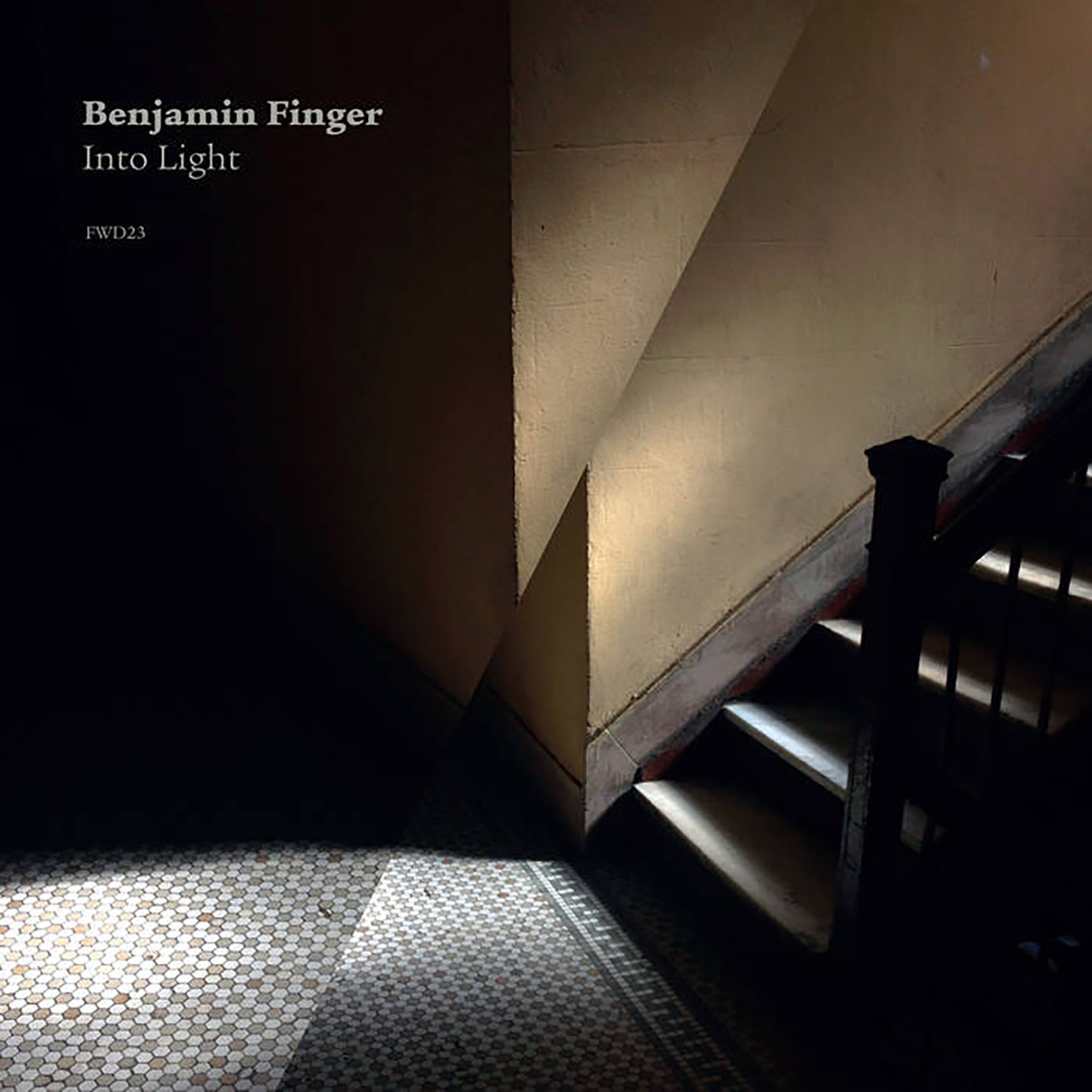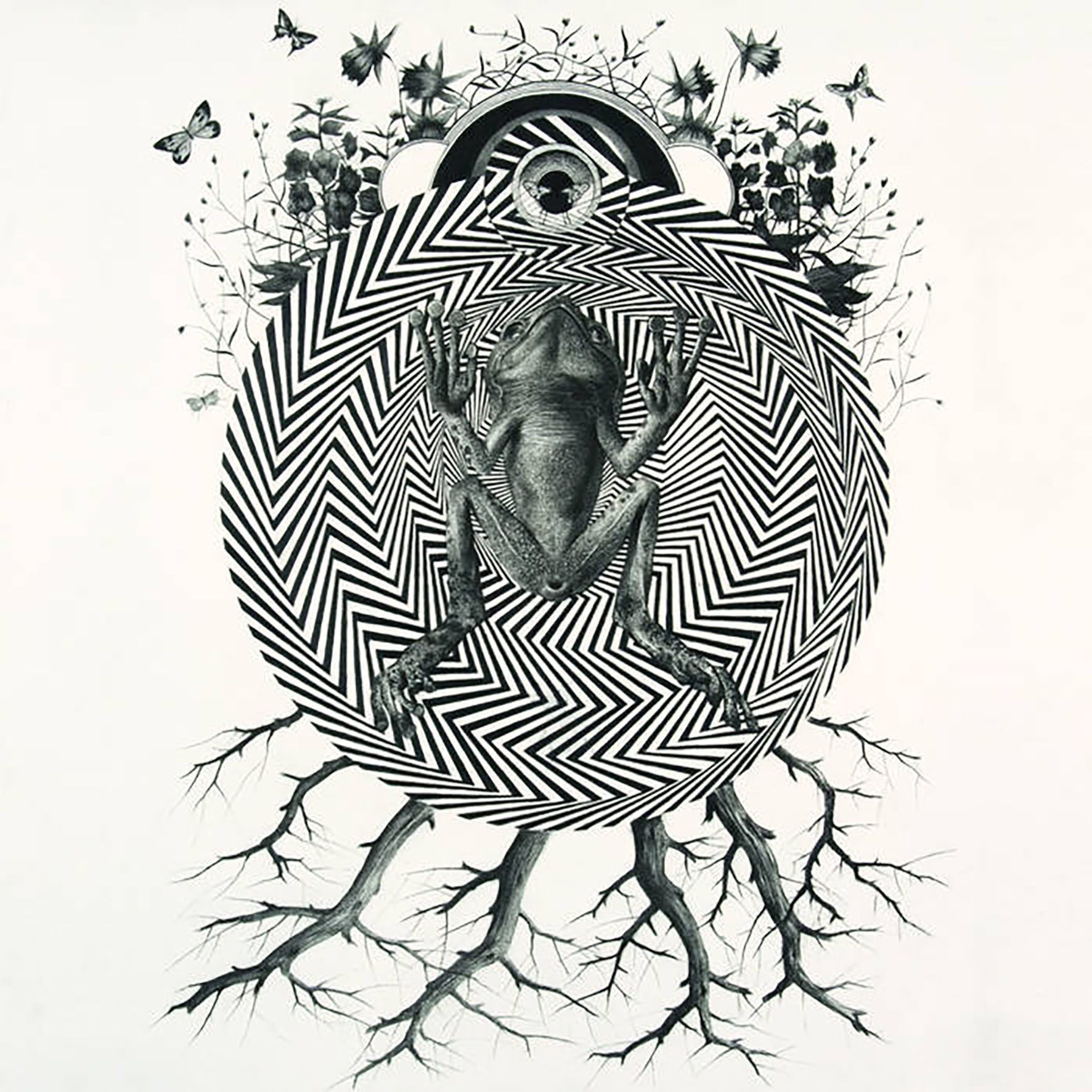 Keeping up with Benjamin Finger’s tireless work ethic in recent years has been an increasing challenge for me, but it has been a worthwhile one, as he manages to maintain a consistently high level of quality and sometimes surprises me with an especially inspired detour or two. Also, his trail of recent releases is not unlike a fun scavenger hunt, leading me from one cool small-press label to another. In the case of Into Light, that small-press label is Berlin’s Forwind and the album is a solid example of Finger's warmly hallucinatory dronescape aesthetic. Pleasure-Voltage, on the other hand, falls into the "inspired detour" category, as Finger debuts an unexpectedly muscular trio with avant-garde violinist Mia Zabelka and extreme music super-producer James Plotkin. The latter album, released on another Berlin label (the eclectic and adventurous Karlrecords), is the more significant by virtue of being unlike anything else in Finger’s discography, but both releases have their share of bright moments.
Keeping up with Benjamin Finger’s tireless work ethic in recent years has been an increasing challenge for me, but it has been a worthwhile one, as he manages to maintain a consistently high level of quality and sometimes surprises me with an especially inspired detour or two. Also, his trail of recent releases is not unlike a fun scavenger hunt, leading me from one cool small-press label to another. In the case of Into Light, that small-press label is Berlin’s Forwind and the album is a solid example of Finger's warmly hallucinatory dronescape aesthetic. Pleasure-Voltage, on the other hand, falls into the "inspired detour" category, as Finger debuts an unexpectedly muscular trio with avant-garde violinist Mia Zabelka and extreme music super-producer James Plotkin. The latter album, released on another Berlin label (the eclectic and adventurous Karlrecords), is the more significant by virtue of being unlike anything else in Finger’s discography, but both releases have their share of bright moments.
Forwind/Karlrecords
Into Light is composed of two long pieces and two short pieces that all fall within Finger's signature terrain of vibrantly textured, shimmering, and melodic psych-collages.Unsurprisingly, it is the more focused, shorter pieces that make the strongest first impression.They arguably make the strongest lasting impression as well, but that is less clear-cut.The opening "A Glimpse" admittedly feels like more of an introduction than a stand-alone piece, but Finger whips up quite an impressively churning and roiling mass of heavy drones and buried harmonies.It is the melodic and comparatively straightforward synth-based title piece that is the album's achingly gorgeous centerpiece though."Into Light" is an uncharacteristically simple and linear composition by Finger standards, but that approach suits the material quite well: a lovely progression of warm chords slowly unfolds in a dreamlike haze of floating harmonies and subtly reality-bending effects.It is a perfectly crafted piece from start to finish, as its strong central theme feels wonderfully pure and undiluted, yet the shifting smears of sound around it stealthily provide layers of harmonic depth and textural nuance.As great as "Into Light" is, however, it is the album's longer pieces that showcase the idiosyncratic vision that makes Finger such a consistently intriguing and distinctive artist."Gravity's Jest" and "Paradox Route" are the sort of fare that one can only find on a Benjamin Finger album.
Initially, "Gravity’s Jest" feels like an uncharacteristically dark and neo-classical piece, as guest cellist Elling Finnanger Snøfugl provides a somber and slow-moving central melody.I suppose that brooding and melancholy theme is arguably the heart of the piece, yet it would be more accurate to describe it as the soil from which Finger's production magic slowly blossoms.By the halfway point, the focus has been deftly shifted away from the groaning strings, as they have become just one component in a shape-shifting fantasia of fluttering, shuddering, buzzing, and bleary aural phantoms. In fact, all traces of that initial theme are long gone when the final movement creeps into being, as the outro is classic sundappled Benjamin Finger-style psychedelia: a billowing, soft-focus swirl of angelic vocal fragments mingling with radiant washes of synthesizer.Into Light's other epic is the lush, swooning ambient haze of "Paradox Route," which weaves a gorgeous, fragile web from Inga-Lill Farstad’s cooing, breathy vocal loops.It would be a perfect piece if it just stayed in that pleasantly delirious and quivering heaven without ever building towards anything more substantial or structured, but build and evolve it does.Still, Finger largely manages to maintain his precarious spell as the mood darkens and the mournful cello returns to lead the way into a surreal miasma of subtly kinetic psych-flourishes. The album's only real weakness is that the heavier moods are not a seamless fit with the lightness, warmth, and playfulness of Finger's bittersweet dreamscapes.When he is at his best, Finger evokes the beautiful innocence of hazy childhood memories like no one else, but it takes a masterful lightness of touch to maintain that illusion.While Finger manages that feat for a few sustained stretches on Into Light, only the title piece does it well enough to rank among his strongest work.
Samples can be found here.

While it is roughly rooted in the same aesthetic terrain as Into Light, Pleasure-Voltage marks an intriguing evolution for Finger, as he enlisted a pair of well-chosen collaborators to run roughshod over his delicate impressionist reveries.Given their historic predilections for heavier, more abrasive sounds, neither Mia Zabelka nor James Plotkin would have ever sprung to mind as likely kindred spirits for a Finger-led ensemble, yet this unlikely trio assembled nonetheless and debuted with a performance at 2018’s REWIRE festival.As befits its unusual collision of disparate aesthetics, the album itself has an unusual structure and origin: Finger composed the framework of Pleasure-Voltage himself, then passed it on to his collaborations to work their chaos-magic.To their credit, neither Zabelka nor Plotkin unleashed a visceral firestorm, gamely adapting their harsher tendencies to Finger's more understated aesthetic instead.That said, I suspect very little of the original structure survived the resultant transformations, as Pleasure-Voltage feels considerably more improvised and unpredictable than Finger's usual soundscapes.It has the spontaneity and life of a live improvisation, but the underlying structure enables these two pieces to feel like the best of both worlds, as the controlled maelstrom repeatedly gives way to reveal sublime oases of melody and harmonic depth.It feels kind of like a crackling electromagnetic cloud is drifting across Finger's warbly, sensuous soundscapes, occasionally allowing processed, childlike voices or a snatches of tender piano melodies to briefly emerge from the entropy only to be soon consumed once more.
Both pieces are too shifting and elusive to allow for simple descriptions, but the opening "Hostile Structures" seems to have a lovely, reverb-soaked piano motif at its heart.It becomes increasingly warped, lysergic, and disrupted as the piece unfolds, however, and it is impossible to tell what any of the individual artists is doing at any given point (all are credited with electronic manipulations of some kind).Near the end, Zabelka briefly unleashes a stuttering and strangled storm of electric violin, but that crescendo is quickly sucked into an even larger crescendo that feels like a howling black hole.Somehow a buried, party-rocking groove emerges from the wreckage, however, and the piece closes with an almost "space rock" outro fighting through a sheen of crackle and static.Initially, "Kaleidoscopic Nerves" is not all that different in tone, but it has a more linear arc, steadily building from bubbling, hazy drones to a low-level grinding and churning intensity.The bottom completely drops out around the midpoint though, and all structure dissolves in a swirling, buzzing haze of floating dissonances.Gradually, a fresh structure slowly comes together for a beautiful final stretch of swooping strings and quavering ambient warmth.I suppose those last few minutes of "Kaleidoscopic Nerves" are the only time Pleasure-Voltage quite flirts with brilliance, but I very much enjoy this trio’s general aesthetic and chemistry.Given the caliber of the participants, I did not expect this resemble any other Benjamin Finger albums and it did not disappoint me in that regard.However, it was still quite a pleasant surprise to find that it did not resemble anything else that I have heard either.
Samples can be found here.
 
Read More

